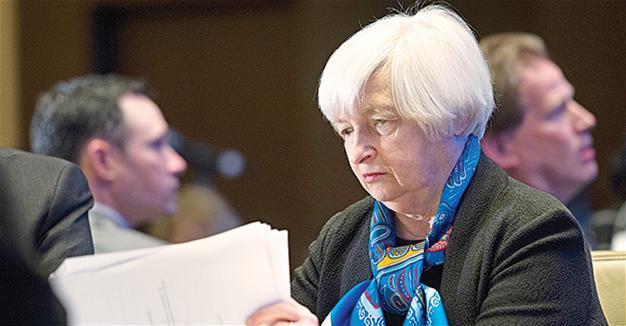Fed’s Yellen says economy steady enough for more hikes, bond wind down
WASHINGTON-Reuters

The United States is healthy enough to absorb further gradual rate increases and the slow wind down of the massive bond portfolio accumulated by the Federal Reserve during the financial crisis, Fed Chair Janet Yellen said in prepared testimony to be delivered to Congress early on July 12.
In what may be one of her last appearances on Capitol Hill, Yellen depicted an economy that, while growing slowly, continued to add jobs, benefited from steady household consumption and a recent jump in business investment, and was now being supported as well by stronger economic conditions abroad.
The Fed “continues to expect that the evolution of the economy will warrant gradual increases in the federal funds rate over time,” Yellen said, while reductions in the Fed’s more than $4 trillion in securities are likely to begin “this year.”
Yellen was scheduled to present her latest economic summary to the House Committee on Financial Services at 10 a.m. (14:00 GMT), after which committee members will question her. Her appearances before the House panel have sometimes involved sharp exchanges with lawmakers who think the Fed’s influence over the economy has grown too large, and who want policymakers to be guided more closely by a mathematical rule for setting interest rates.
In a report released last week the Fed compared its current policy to that prescribed by a variety of such rules - pointing out that the choice of a rule itself involved judgments that would lead to vastly different outcomes. Yellen referred House lawmakers specifically to that section of the report in her testimony.
Yellen’s appearance comes as the Trump administration mulls whether to replace her when her term ends in February.
U.S. stock index futures rose on her remarks while yields on Treasuries fell and the dollar declined against a basket of currencies.
By her testimony today, the economy is currently on an even keel, near or beyond full employment and the Fed is steadily moving rates higher. The reduction in the balance sheet, which will begin slowly as the Fed reinvests only a portion of the holdings that mature each month, will mark the final exit from crisis-related policies.
One potential issue: the Fed wants to keep policy accommodative to continue supporting the recovery, but may be approaching a “neutral” rate faster than expected. Estimates of the inflation-adjusted neutral rate have been falling, and by some accounts may be near zero. Yellen has said the Fed expects estimates of the neutral rate to rise over time. But unless that happens, or inflation picks up, the Fed may only have a few rate increases left before it hits a level that is no longer felt to be encouraging spending and investment.
Yellen said in her testimony that as it stands rates “would not have to rise all that much further” to reach neutral.
Though a recent dip in inflation has been of concern among Fed officials who want to see surer progress toward the central bank’s 2 percent inflation goal, Yellen ascribed it to “a few unusual reductions in certain categories of prices” that would eventually drop out of the calculation.
The current situation “raises the stakes” for upcoming inflation data, said Jim Vogel, interest rate strategist for FTN Financial in Memphis, Tennessee. “People are going to be very anxious if that was just a statistical glitch...or if it is going to continue.”
Otherwise, Yellen said, the economy appeared to be in a virtuous loop of hiring, spending and investment that “should increase resource utilization somewhat further, thereby fostering a stronger pace of wage and price increases.”
 The United States is healthy enough to absorb further gradual rate increases and the slow wind down of the massive bond portfolio accumulated by the Federal Reserve during the financial crisis, Fed Chair Janet Yellen said in prepared testimony to be delivered to Congress early on July 12.
The United States is healthy enough to absorb further gradual rate increases and the slow wind down of the massive bond portfolio accumulated by the Federal Reserve during the financial crisis, Fed Chair Janet Yellen said in prepared testimony to be delivered to Congress early on July 12.